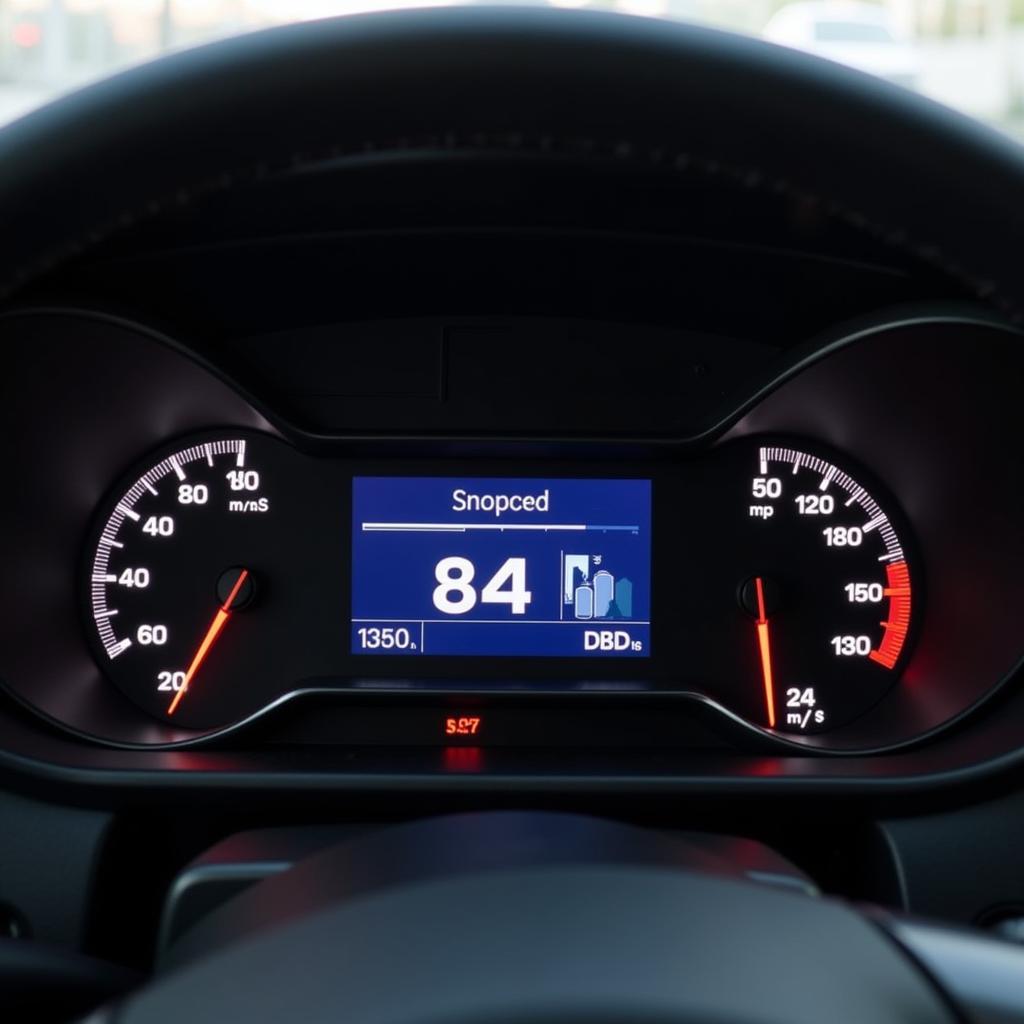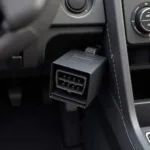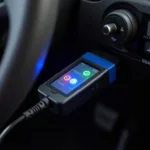Ever glance at your speedometer and question its accuracy? You’re not alone. Many car owners wonder about the precision of their vehicle’s speed reading, especially when it comes to OBD2 data. While your car’s built-in speedometer might be slightly off, the data retrieved through an OBD2 scanner offers a deeper understanding of your car’s speed in meters per second (m/s) accuracy.
Decoding OBD2 Car Speed Data
OBD2 scanners have become indispensable tools for car enthusiasts and professionals alike. They provide a wealth of information, including vehicle speed, by tapping into the car’s computer system. But how does this data translate to real-world accuracy?
The accuracy of OBD2 car speed readings is generally considered to be very high, often within 1-2% of the actual speed. This precision stems from the fact that the OBD2 system receives data directly from the vehicle speed sensor (VSS), a component that monitors wheel rotation speed.
Factors Affecting OBD2 Speed Accuracy
While OBD2 speed readings are generally reliable, several factors can influence their accuracy:
- Tire size: Using tires with a different circumference than the factory-recommended size can create discrepancies between actual speed and OBD2 readings.
- VSS malfunction: A faulty vehicle speed sensor can send inaccurate data to the OBD2 system.
- Signal interference: Electrical interference can disrupt the communication between the VSS and the OBD2 scanner, potentially affecting data accuracy.
Comparing OBD2 Speed to GPS Data
To get a better sense of your OBD2 scanner’s accuracy, you can compare its readings to a GPS device. While both systems measure speed, they do so differently. OBD2 relies on wheel rotation, while GPS utilizes satellite signals to determine position and calculate speed.
In ideal conditions, both OBD2 and GPS should provide very similar speed readings. However, GPS signals can be affected by tall buildings or dense tree cover, leading to slight variations in speed calculation.
Importance of Accurate Speed Data
Understanding your car’s speed accurately is about more than just avoiding speeding tickets. Here’s why it matters:
- Vehicle performance: Monitoring speed data helps track your car’s performance and identify potential issues that might be affecting acceleration or overall engine health.
- Fuel efficiency: Maintaining a consistent speed, as indicated by an accurate OBD2 reading, can contribute to better fuel economy.
- Safety: Having a precise understanding of your speed, especially in critical situations, can be crucial for safe driving.
OBD2 Speed: Beyond the Basics
While OBD2 scanners primarily provide instantaneous speed data, they can also offer insights into:
- Average speed: This data helps analyze driving patterns and fuel efficiency over a specific trip.
- Maximum speed: Knowing your vehicle’s peak speed can be helpful for performance tracking and diagnostics.
Conclusion
OBD2 scanners provide remarkably accurate car speed readings in meters per second, offering valuable insights into your vehicle’s performance and your driving habits. By understanding the factors that can influence these readings and comparing them with other sources like GPS, you can ensure the data you’re receiving is reliable and make informed decisions about your car’s maintenance and your driving style.
Remember, accurate speed data is not just about avoiding tickets; it’s about maximizing your vehicle’s performance, optimizing fuel efficiency, and, most importantly, enhancing your safety on the road.
FAQs
1. Can I use any OBD2 scanner to check my car speed?
Yes, most OBD2 scanners can access and display vehicle speed data. However, the accuracy and the way the information is presented might vary depending on the scanner model and software.
2. My OBD2 speed reading is different from my car’s speedometer. Which one is correct?
OBD2 readings are generally considered more accurate because they receive data directly from the vehicle speed sensor. Car speedometers are often calibrated to show a slightly higher speed to provide a safety margin.
3. Can I calibrate my OBD2 scanner for more accurate speed readings?
While some advanced OBD2 scanners might offer calibration options, it’s not recommended to attempt calibration yourself unless you have the technical expertise. Consult a qualified mechanic or automotive specialist for assistance.
4. What should I do if I suspect my OBD2 speed readings are inaccurate?
First, check for any obvious factors like incorrect tire size. If the issue persists, it’s best to have your vehicle inspected by a mechanic to diagnose and fix any potential problems with the vehicle speed sensor or the OBD2 system itself.
5. Can I use OBD2 speed data for legal purposes, such as contesting a speeding ticket?
While OBD2 data can provide valuable information, its admissibility as evidence in legal cases varies depending on the jurisdiction and specific circumstances.
Do you have other questions? We have more helpful articles on our website. Check out our guides on ELM327 OBD2 PCB, OBD2 ELM327 Bluetooth Software for Windows 7, and Scanner HH OBD2 ELM327 Bluetooth for more information.
Need assistance? Contact our 24/7 customer support team via WhatsApp: +1(641)206-8880 or Email: cardiagtechworkshop@gmail.com.


